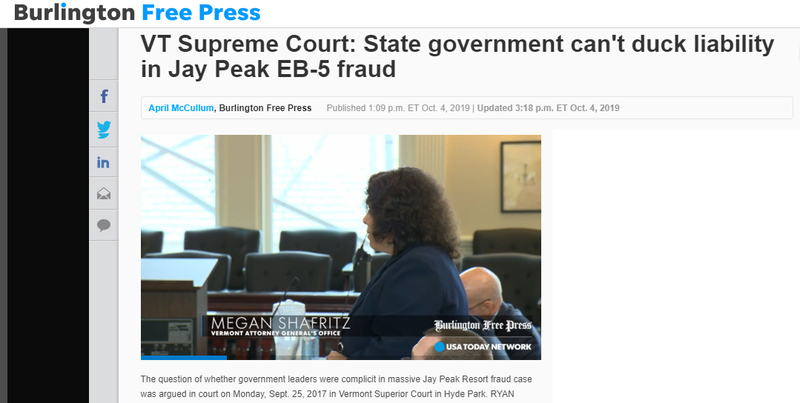VT Supreme Court: State government can't duck liability in Jay Peak EB-5 fraud
Stowe brewery that made its name with Heady Topper pays tribute to the importance of bees in our food system and the need for renewable energy Brent Hallenbeck
The Vermont Supreme Court has revived a lawsuit against state government by a group of investors in Vermont's largest and most infamous economic development effort, the EB-5 projects tied to Jay Peak Resort.
The investors each contributed $500,000 to the projects, which were led by businessmen Ariel Quiros, and Bill Stenger.
The Vermont Agency of Commerce and Community Development acted as an administrator and overseer of the developments. The state's role lent the projects credibility, and Republican and Democratic governors lauded and supported Stenger and Quiros.
Investors allege that state officials failed to provide oversight and ignored red flags as money was misappropriated from 2008 until 2016.
Friday ruling
In the ruling Friday, the Supreme Court said investors had grounds to sue the state for negligence and breach of contract, reversing a lower court's decision to dismiss the lawsuit. The Supreme Court rejected the Attorney General's Office's claim that the state of Vermont and all state officials were immune from liability.
"After inducing plaintiffs to invest in the Jay Peak Projects by promising to provide the 'extra safeguard of state oversight,' ACCD had a duty to provide that promised oversight," Associate Justice Beth Robinson wrote for a unanimous court.

The new Tram Haus Lodge was the first project completed under Jay Peak Resort's new redesign on Wednesday Feb. 8, 2012.
The court said that investors also have grounds to sue Brent Raymond and James Candido, who each formerly served as executive director of the Vermont EB-5 Regional Center, for gross negligence.
Claims against former ACCD Secretaries Patricia Moulton and Lawrence Miller, as well as claims against former Regional Center director Eugene Fullam and ACCD general counsel John Kessler, were dismissed. Securities fraud claims against the state and its officials were also dismissed.
The Supreme Court sent the case back to trial court for more proceedings.
"We're pleased that the Vermont Supreme Court recognized our clients' claims, and we’re anxious to move forward and get justice for our clients," said Russell Barr, a Stowe-based lawyer who represents the investors. Barr said the next steps in court would be to request documents and depositions from state officials.
Attorney General T.J. Donovan noted that the Supreme Court had taken no position on the accuracy of the plaintiffs' claims.
"The State looks forward to litigating the remaining claims and is confident the evidence will show that all the claims against the State and its employees must be dismissed," Donovan said in a statement.
Mentions
- Vermont Agency of Commerce and Community Development RC
- Brent Raymond
- Vermont EB5 Regional Center
- Ariel Quiros
- Bill Stenger
Litigation Cases
- United States of America vs Ariel Quiros & Bill Stenger
- Michael I. Goldberg vs Ariel Quiros
- MICHAEL I. GOLDBERG vs The AM Wealth Management Group of Raymond James & Ariel Quiros & Joel Burstein
- JAMES B. SHAW, JOHANNES EIJMBERTS, and LORNE MORRIS Individually and On Behalf of All Others Similarly Situated, vs The AM Wealth Management Group of Raymond James & Bill Stenger & Joel Burstein & Ariel Quiros
- ALEXANDRE DACCACHE, on behalf of himself and all others similarly situated vs Ariel Quiros & Bill Stenger & The AM Wealth Management Group of Raymond James & Joel Burstein
- State of Vermont vs Bill Stenger & Ariel Quiros
- UNITED STATES SECURITIES AND EXCHANGE COMMISSION vs Ariel Quiros & Bill Stenger
States
- Vermont
Securities Disclaimer
This website is for informational purposes only and does not constitute an offer or solicitation to sell shares or securities. Any such offer or solicitation will be made only by means of an investment's confidential Offering Memorandum and in accordance with the terms of all applicable securities and other laws. This website does not constitute or form part of, and should not be construed as, any offer for sale or subscription of, or any invitation to offer to buy or subscribe for, any securities, nor should it or any part of it form the basis of, or be relied on in any connection with, any contract or commitment whatsoever. EB5Projects.com LLC and its affiliates expressly disclaim any and all responsibility for any direct or consequential loss or damage of any kind whatsoever arising directly or indirectly from: (i) reliance on any information contained in the website, (ii) any error, omission or inaccuracy in any such information or (iii) any action resulting therefrom.




